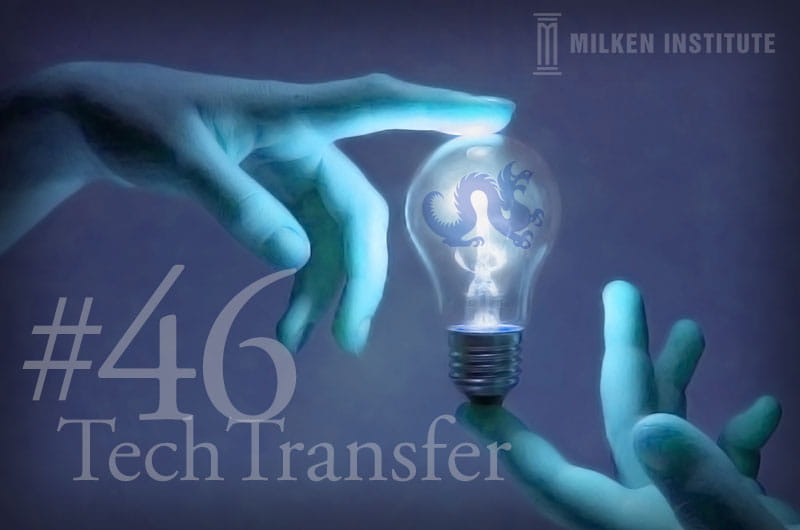Milken Institute Ranks Drexel University in Top 20 for Tech Transfer

- Drexel Selects New, World-Class Life Sciences Building at 3201 Cuthbert Street for Medical Research Operations
- Turn Happy Places and Memories into a Happy New Year
- Breakthrough on Gene Therapy for Hereditary Spastic Paraplegia
- Drexel Environmental Collaboratory Releases Cross-Sector Findings on Severe Weather Recovery Challenges

In a report recently released by the Milken Institute, an independent economic think tank, Drexel University was ranked 46th out of 225 universities across the country based on its “technology transfer,” or ability to translate its academic innovators’ research into actual technologies, products and research-driven startups.
The report, titled “Concept to Commercialization: The Best Universities for Technology Transfer,” evaluated Drexel and other universities through the data reported from 2012–15 in four main categories: patents, licenses executed, licensing income and startups launched. These averages were reviewed and graded both in terms of actual numbers and as adjusted per research dollars, which values on a comparative scale how much was accomplished with a university’s amount of research funding. Drexel ranked above area institutions like Penn State (81), Temple University (99) and Thomas Jefferson University (129).
“Drexel’s strong record of success in driving ideas from the research stage to real-world application tells faculty and student innovators that the University is the right place for them to connect to the entrepreneurial ecosystem,” said Drexel University President John Fry.
In the years that the Milken Institute examined, Drexel faculty generated anywhere from 110 to 120 inventions every year. The University received about 40 to 45 patents and made more than 30 licensing and commercialization agreements per year. About four to six new companies were created annually through faculty startups.
The Milken Institute’s report illustrates how Drexel outperformed many other universities that received more funding but created fewer patents, licenses and startups. Typically, the University receives about $110 million per year in research expenditures, but its output rivals that of universities that receive anywhere from three to five times that amount.
“The culture of use-inspired research and scholarship that exists at Drexel is unique and differentiates us from our peers,” said Senior Vice Provost for Research Aleister Saunders, PhD. “The faculty’s discoveries coupled with Drexel Ventures’ understanding of markets and patent landscapes is critical to driving this ranking.”
Drexel Ventures was created to accelerate the activities of Drexel’s academic innovators. In addition to supporting the faculty through filing invention disclosures, securing patents and managing the resulting intellectual property, the Drexel Ventures team provides a comprehensive array of services, including patent marketing and licensing, proof of concept and seed funding programs, startup consulting and venture capital cultivation, using their extensive experience to provide the full spectrum of commercialization options.
“Across disciplines, Drexel faculty are very engaged and eager to work with companies and entrepreneurs through the licensing of our patents,” said Bob McGrath, PhD, senior associate vice provost and executive director of technology commercialization with Drexel Ventures.
“In addition, our new platform to transition technologies to the marketplace through startups and venture creation is well-positioned to leverage the rapidly evolving venture and corporate capital landscape,” said Shintaro Kaido, a director with Drexel Ventures.
Drexel is also in a unique position to leverage its faculty’s research prowess and culture to create regional economic development.
“We are building the entire innovation continuum including corporate partnerships, research, and technology commercialization all in a community called Schuylkill Yards,” said Keith Orris, Drexel’s senior vice president for corporate relations and economic development, who leads Drexel Ventures. “A community where private innovators, researchers and corporations are attracted, who want to thrive in a creative place at the gateway to Drexel’s campus and in the heart of the Northeast Corridor.”
Drexel is perfectly positioned with an academic culture, research talent, spirit and a place to accomplish precisely what the Milken Report recommends: universities using their resources to make a greater economic impact.
Last year, Drexel placed 37th on a list of worldwide universities granted U.S. utilities patents, as previously reported in DrexelNow, which was higher than it had ranked in the past.
And as the Milken Institute rankings show, Drexel is competing against — and beating — top research universities across the country.
In This Article
Drexel News is produced by
University Marketing and Communications.
